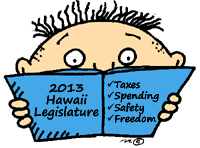In 2013, 276 bills became law in Hawaii, and an additional 12 bills became law without Governor Neil Abercrombie’s signature.
I skimmed through the legislation summaries and highlighted the laws that I think are important and will impact us all. If I’ve missed any significant or costly laws (in terms of spending or freedoms), please let me know!
Last week, I highlighted two of the best bills of the session, and covered bills that I think are trade-offs between public safety and person freedom, bills that make our government bigger, and bills that spend more taxpayer money.
This week, I’m looking bills that lower taxes (though not for everyone), bills that affect education, and bills that affect Native Hawaiians.
Lower taxes and tax credits:
* Credits for filming in Hawaii: We have extended the motion picture, digital media, and film production income tax credit to 2019 and increased the credit ceiling to $15 million (Act 89). Noteworthy productions: “Hawaii Five-O” (2010-current), “The Hunger Games: Catching Fire” (2013), and “Godzilla” (2014).
* Lowering the already high Transient Accommodations Tax (TAT): The additional tax has been repealed, and the tax rate has returned to 9.25%. With funds from the TAT, we’ll create Hawaiian center and the Museum of Hawaiian Music and Dance; excess revenues will go to the general fund (Act 161). I think we should make it even less expensive for visitors to come to Hawaii, because there are closer and cheaper vacation destinations. I understand that making Hawaii expensive to visit is a marketing strategy, but we have to live here. The provision about excess tax revenues seems unrealistic (or a way to grab tax money).
* Exemptions for condo associations and hotel operators: Condominium and hotel common expenses will be exempt from the general excise tax (Act 163). This exemption makes sense; the condo associations and hotels are not making a profit on those expenses. It would be like taxing yourself for buying a hammer to make home repairs.
* No limits on charitable giving: We now exempt charitable income tax deductions from the itemized deduction caps (Act 256). Hopefully this will encourage charitable giving among the people who can give the most. But how many people will be affected by this and how much of an impact will it really have?
Education:
* Educating future farmers: The Department of Education must operate and implement the Future Farmers of America program, at a cost of $75,000 for fiscal year 2013-2014 (Act 204). Why is this program implemented through the DOE? Shouldn’t it be headed by the Department of Agriculture, which has the knowledge and expertise about agriculture?
* Making preschool more accessible: We established the voluntary Preschool Open Doors Program, which will cost $6 million in preschool subsidies for fiscal year 2014-2015, as well as $1.16 million over two years for three temporary positions and to contract services (Act 169). Kindergarten was originally “preschool” and was meant to get children ready for school. In my opinion, preschool is not the right solution for everyone; most children would benefit from being close to family and home in the early years. It is also important to note that the Hawaii legislature created a preschool “crisis” by repealing the junior kindergarten program with Act 178 in 2012.
* Audits and disclosures for charter schools: There are now provisions for charter schools relating to annual independent financial audits, criminal history record checks, enrollment, conflicts of interest and disclosure, facilities funding, and hiring (Act 159). This is long over-due and is just basic business sense. Any organization, especially one that receives public funds and works with children, should operate with basic safety and financial disclosures – and should be accountable to the public.
Native Hawaiian Affairs:
* Who is “Native Hawaiian”? The definition of “qualified Native Hawaiian” now includes individuals who meet certain expanded ancestry requirements, as certified by the Native Hawaiian Roll Commission (Act 77). This seems to automatically enroll people in the Native Hawaiian Roll Commission who may have confirmed their ancestry for non-political reasons (such as education). Are there provisions to let people know they have been automatically enrolled, and to allow them to opt-out?
* Office of Hawaiian Affairs (OHA) elections: Board members for OHA will now be elected through nonpartisan primary and general elections (Act 287). This sounds reasonable: instead of being overwhelmed by candidates, voters can focus on fewer candidates in a general election, and candidates who are elected in primary elections can focus on their campaigns.
* Making room for canoes: The Department of Land and Natural Resources (DLNR) must accommodate mooring of native Hawaiian canoes owned or leased by nonprofit entities and used for educational purposes in small boat harbors (Act 243). This sounds reasonable: canoes and other watercraft should have fair and equal access to public facilities.
How would you rate our Hawaii legislature? What do you think are their best accomplishments and most misguided undertakings in 2013? What do you expect from our Hawaii legislature now that the 2014 session is underway?
